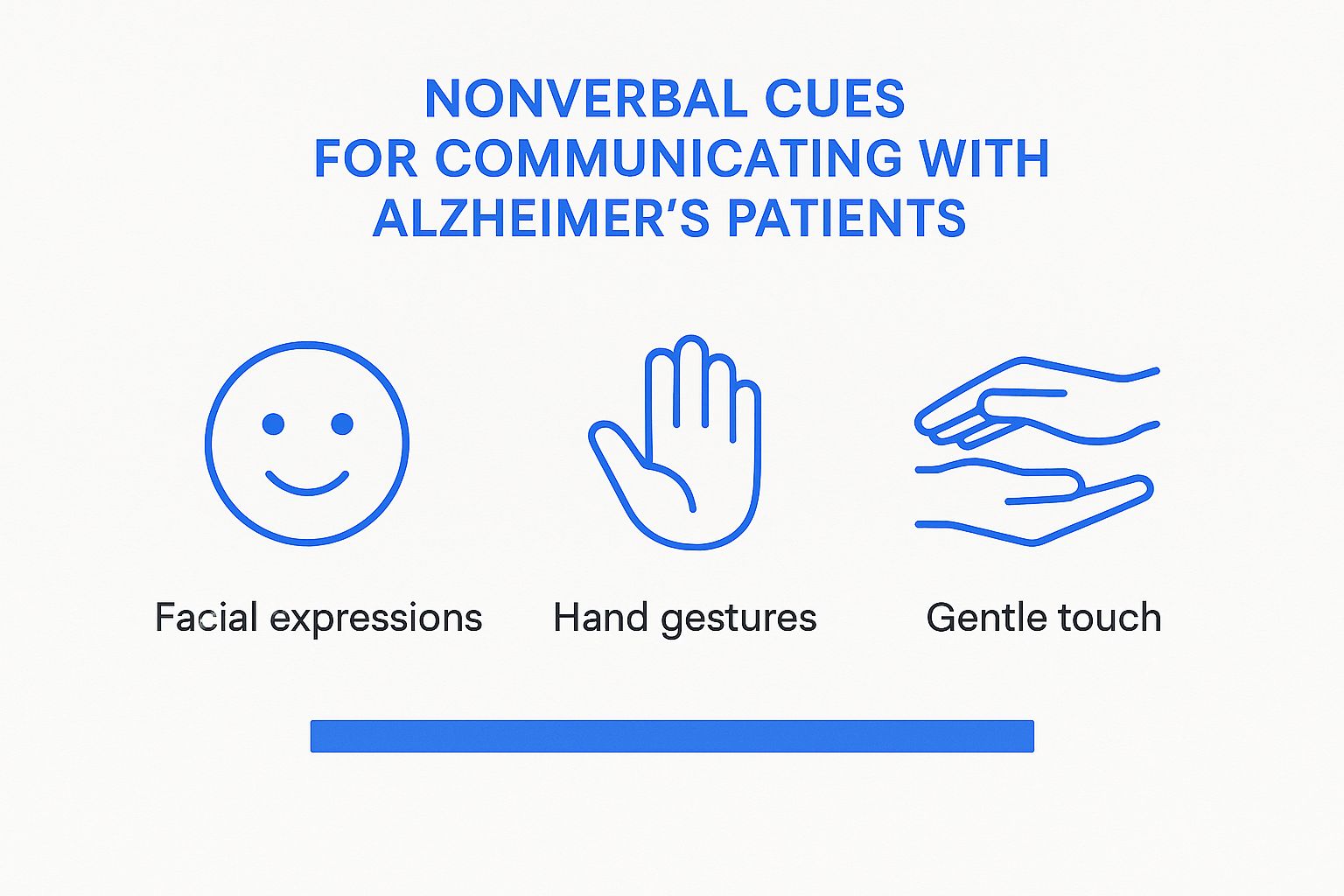When you're trying to communicate with someone living with Alzheimer's, it's easy to get frustrated. The old ways of talking just don't work anymore. The real key is to shift your entire mindset—you're no longer just exchanging information, you're building a connection.
It's about leaning into simple language, being incredibly patient, and letting your non-verbal cues do the heavy lifting. A calm tone of voice or a gentle touch on the arm can provide more comfort and preserve more dignity than any perfectly phrased sentence.
The Heart of Connection in Alzheimer's Care
Learning to communicate with a loved one with Alzheimer's isn't about memorizing a script. It’s about adopting a whole new way of being with them. As the disease moves forward, it completely rewires how they process language and see the world, which can be tough on everyone.
The goal is to stop correcting or quizzing them. Instead, focus on offering reassurance and keeping that emotional bond strong. You have to change how you see your interactions. It's not about getting a task done; it's about sharing a moment together.
That warm smile, that simple touch, the gentle and steady tone of your voice—these become your primary tools. When words start to fail, these non-verbal signals become a universal language, speaking volumes of safety, love, and understanding.
Why Effective Communication Matters
The cognitive decline from Alzheimer's hits language and comprehension skills hard. And this isn't a small problem. Around 55 million people live with dementia across the globe, a number projected to hit 79 million by 2030.
When communication breaks down, it often leads to behavioral shifts like agitation, frustration, or withdrawal. Keeping that line of connection open is absolutely essential. It’s the foundation of compassionate care and a stronger bond between you and the person you're looking after. You can explore further research on the importance of communication in dementia care to see just how deep the impact is.
"Just because someone has cognitive impairment, they're no less than anyone else. Yes, their cognitive abilities are less than they were, but everyone should be treated with respect."
Adopting a Patient and Simple Approach
If you take one thing away, let it be this: patience is everything. The person you're with might need a lot more time to figure out what you've said or to find their own words. Jumping in to finish their sentences or rushing them only adds to their stress.
Instead, try to build these habits into your daily interactions:
- Simplify Your Language: Stick to short, direct sentences. Ask just one question at a time.
- Maintain Eye Contact: This shows you’re present and helps them focus on you.
- Listen Actively: Don't just hear the words; listen for the emotion behind them. Are they trying to express a need for comfort or reassurance?
- Create a Calm Environment: A blaring TV or lots of background chatter can be incredibly overwhelming. Minimize distractions to make conversation less of a struggle.
Before we dive into strategies for each stage of the disease, it’s helpful to have a solid grasp of the core ideas that apply no matter what.
The table below summarizes the fundamental principles that will guide every interaction, helping you build a foundation of trust and safety.
Core Principles of Alzheimer's Communication
| Principle | Why It Matters | Quick Example |
|---|---|---|
| Be Patient and Calm | Rushing or showing frustration creates anxiety and can shut down communication entirely. | Give them plenty of time to find their words. If they can't, offer a gentle guess or change the subject. |
| Simplify Your Language | Complex sentences and multi-step questions are difficult to process. | Instead of, "Do you want to put on your sweater and go for a walk?" try, "Here is your sweater." Then, "Let's go for a walk." |
| Use Non-Verbal Cues | Your tone, facial expressions, and touch convey more emotion and reassurance than words often can. | Approach with a warm smile. Use a gentle touch on the arm to get their attention before you speak. |
| Don't Argue or Correct | Their reality may be different from yours. Arguing only causes agitation and distress. | If they say they need to see their mother (who passed years ago), respond to the emotion: "You miss your mom. Tell me about her." |
| Listen with Your Heart | The true meaning is often in the emotion, not the words. Look for the underlying need. | If they are repeating a word or phrase, they might be trying to express a feeling like hunger, pain, or fear. |
| Create a Quiet Space | Distractions make it harder for them to focus and understand. | Turn off the TV or radio before starting a conversation. |
By keeping these principles in mind, you can transform daily interactions from sources of stress into moments of connection. This approach reduces distress for both of you and sets the stage for the more specific, stage-based strategies we'll explore next.
Communicating During Early-Stage Alzheimer's

In the early stages of Alzheimer's, the person is often painfully aware of the changes happening in their mind. They know when they can't find the right word or recall a recent conversation, and this awareness can stir up a lot of frustration, anxiety, and even embarrassment.
This is a critical time. Your role isn’t to correct them, but to become their supportive partner. The way you communicate now really sets the tone for your relationship as the disease progresses. The goal is to help them maintain their independence and feel good about themselves. This means shifting your mindset from fixing mistakes to offering gentle, respectful support.
For instance, if you see them searching for a word, fight the urge to jump in and say it for them. Instead, give them a subtle clue. If they’re trying to remember their favorite restaurant, you could say, "It’s that place we love with the great pasta." This little bit of help allows them the satisfaction of finding the word on their own.
Fostering Independence Through Inclusion
Feeling a sense of control over their own life is absolutely crucial for someone in the early stages. Whenever you can, bring them into decisions, especially the ones that affect their daily routine. It’s a powerful way to show them that their opinions and preferences still matter.
Instead of asking a big, open-ended question like, "What do you want to do today?" which can feel overwhelming, try offering simple choices.
- "Would you prefer to go for a walk in the park or sit in the garden for a while?"
- "We can have chicken or fish for dinner. Which sounds better to you?"
This simple change in framing gives them a sense of agency without causing any cognitive strain.
By offering structured choices, you empower the person to participate in their own life, which is vital for their dignity. It turns a potentially stressful interaction into a moment of collaboration and respect.
Navigating Difficult Conversations
Let's be honest: planning for the future is tough, but it's necessary. Talking about legal documents, finances, or long-term care requires a lot of empathy and perfect timing. The key is to frame these conversations as a partnership.
Start by being a little vulnerable yourself to create a safe space. You might say something like, "I was thinking about the future, and it would give me so much peace of mind if we could get our plans in order together." This approach immediately makes it about teamwork.
Here are a few conversation starters that feel positive and collaborative:
- For finances: "Let’s make sure all our important papers are organized so we don't have to worry about them later. Where do you think we should start?"
- For healthcare: "I want to be sure I always know what you would want. Could we talk about your healthcare wishes so I can be the best support for you?"
Keep these conversations short and stick to one topic at a time. The real goal here is to plan together, which helps preserve a sense of normalcy and strengthens your bond.
Adapting Your Approach for the Middle Stages
As Alzheimer's moves into the middle stages, the communication landscape shifts dramatically. You'll notice your loved one struggling more to find the right words or follow complex thoughts. It can be deeply frustrating for both of you. This is the point where your role changes—you're no longer just a conversation partner, but a gentle, reassuring guide.
Simplifying how you speak becomes absolutely essential. Long explanations and questions with multiple steps are just too overwhelming. Instead, stick to short, direct sentences with just one idea. For example, instead of asking, "What would you like for lunch today?" which requires both recall and a decision, try offering a simple choice: "Would you like soup or a sandwich?"
This also applies to the questions you ask. Moving to simple yes-or-no questions can significantly reduce their cognitive load, making daily interactions much smoother and far less stressful.
The Power of Non-Verbal Cues
When words start to fail, your non-verbal communication becomes your most powerful tool. A warm smile, a gentle touch on the arm, or making direct, friendly eye contact can say more than a whole sentence. It tells them they're safe, understood, and loved, even when the words aren't there.
This image shows three essential non-verbal cues that can really strengthen your connection.

As you can see, your expressions, gestures, and touch all work together to create a calm, reassuring presence—and that's the foundation for any positive interaction.
Always make sure your body language sends a message of patience and love. Approach them from the front so you don't startle them, say their name to get their attention, and keep your posture relaxed. These small adjustments create an environment where connection can happen.
Verbal vs Non-Verbal Communication Techniques
As you navigate the middle stages, you'll find yourself blending both verbal and non-verbal approaches. Knowing which one to use and when can make all the difference.
| Technique Type | Specific Action | Best For |
|---|---|---|
| Verbal | Using simple, one-idea sentences. | Giving clear instructions or offering simple choices. |
| Non-Verbal | Offering a warm smile or gentle touch. | Providing reassurance, comfort, and showing affection. |
| Verbal | Asking yes-or-no questions. | Reducing cognitive load during decision-making. |
| Non-Verbal | Maintaining friendly eye contact. | Establishing a connection and showing you are present. |
| Verbal | Speaking slowly and calmly. | Ensuring your words are understood without pressure. |
| Non-Verbal | Using gestures to demonstrate an action. | Clarifying a verbal request, like drinking from a cup. |
This table is a starting point. The best approach is often a combination, like offering a choice verbally ("Would you like some water?") while also using a gesture (holding up a glass).
Managing Repetitive Questions and Behaviors
Repetitive questioning is one of the most common—and draining—challenges of this stage. When you've answered the same question for the tenth time, it's easy to lose your patience. It’s so important to remember this isn't intentional; it's a symptom of the disease. They're often looking for reassurance or trying to express an unmet need.
Instead of snapping, "I just told you that," try to tune into the feeling behind the question. If your mom keeps asking what time her daughter is visiting, she's likely feeling a bit lonely or anxious.
Respond to the feeling, not just the words. You could say, "It sounds like you're really looking forward to seeing her. She’s coming after dinner." Then, gently redirect her attention to something pleasant, like looking through a photo album or putting on her favorite music.
This approach is a delicate balance. Research shows that as verbal skills decline, caregivers need to adapt with simpler language, non-verbal cues, and a whole lot of patience. As one study on caregiver communication highlights, individuals may need extra time to process information and will repeat themselves without realizing it. You can learn more about these communication findings and their impact on care. By addressing their underlying emotional state, you can reduce their anxiety and create a more peaceful interaction for both of you.
Connecting Beyond Words in Late-Stage Alzheimer's

When Alzheimer’s advances into its later stages, the ability to speak often fades. This can feel like a devastating loss, but it is not the end of your connection. What happens is that your interactions simply evolve—they move beyond words into a rich, sensory world where your presence and a gentle touch become the primary language.
Your focus now is on providing comfort and reassurance through the five senses. Your loved one's world has become smaller and more immediate, so grounding them in the present moment with positive sensory input can be incredibly powerful.
This is a time to lean into the simple, profound act of just being together. The goal isn't to get a specific response; it's about sharing a peaceful moment and letting them know they are safe, cared for, and loved.
Engaging Through Sensory Experiences
Even when conversation is no longer possible, you can still share incredibly meaningful interactions. Think about what brought your loved one joy in the past and find simple ways to adapt those experiences to their current abilities.
Here are a few ways to connect on a sensory level:
- Touch: This might just be the most essential form of communication now. Gently hold their hand, stroke their arm, or wrap them in a soft, warm blanket. The simple act of applying their favorite scented lotion can become a deeply calming daily ritual.
- Sound: Music is powerful. Play songs from their youth or favorite hymns. Even as other memories and abilities decline, the brain's connection to music often remains surprisingly strong. The rhythm of a familiar song can ease agitation and bring visible moments of peace and even joy.
- Sight: Look through old photo albums together. You can point out familiar faces and share a quiet moment of remembrance, even if they can't respond verbally. Keeping beloved objects, family pictures, or a favorite piece of art in their line of sight helps create a comforting, recognizable space.
- Smell: Familiar scents can trigger deep-seated feelings of comfort and home. Try using a lotion with a fragrance they always loved, baking a simple loaf of bread, or bringing fresh flowers into the room.
In late-stage Alzheimer's, communication is less about an exchange of information and more about a transmission of feeling. Your calm presence, a gentle touch, or a familiar melody can convey love and safety more effectively than any words.
Interpreting Non-Verbal Cues
Even without words, your loved one is still communicating. Your role is to become a kind of gentle detective, learning to read their non-verbal cues to better understand their needs and emotions.
Pay close attention to the small things. A wince or a frown might indicate pain or discomfort. Restlessness or fidgeting could signal a need to move or use the restroom. A soft sigh or a relaxed face can show contentment. Responding to these cues—perhaps by adjusting their position or simply speaking in a soothing voice—shows them you are still listening.
Ultimately, your presence is the most important gift you can give. Simply sitting quietly, holding their hand, and speaking in a calm, gentle tone reinforces your bond. It's a powerful reminder that even when memories fade and words are lost, the connection of love remains. This deepens your understanding of how to communicate with Alzheimer’s patients when traditional methods are no longer an option.
Practical Do's and Don'ts for Daily Interactions
Figuring out how to communicate with someone living with Alzheimer's isn't about memorizing a script. It’s more of a mindset shift, a collection of small adjustments to your daily habits that can make a world of difference.
Think of this as your quick-reference guide. We’ve broken down some key ideas into simple do's and don'ts you can start using right away. For every "don't," we’ll give you a positive "do" to navigate those tricky moments with a bit more grace.
Don't Correct Their Reality
It's natural to want to correct someone when they say something that isn't true. If your dad insists he needs to catch a bus to a job he hasn’t had in 30 years, arguing is a dead end. It will only make him confused and agitated because, in that moment, his reality is simply different from yours.
Do Agree, Validate, and Redirect
Your best move is to step into their world for a moment. Instead of fighting the facts, respond to the feeling behind what he's saying. He might be expressing a need for purpose or a familiar routine.
Try saying something like, "You're right, we do need to think about that. But first, could you give me a hand with this?" Then, gently guide his attention to a simple, tangible task, like folding towels or looking through an old photo album. This approach validates his feelings without sparking a conflict.
Don't Ask "Do You Remember?"
We often say this with the best intentions, but asking someone with dementia if they remember something can feel like a pop quiz they're doomed to fail. It can stir up feelings of shame, anxiety, or frustration, effectively shutting down the conversation.
Do Share the Memory for Them
Instead of quizzing them, bring the memory to them as a gift. Frame it as your own recollection, with no pressure for them to contribute.
- Instead of: "Do you remember our trip to the beach?"
- Try: "I was just thinking about that trip we took to the beach. I loved how you’d listen to the sound of the waves for hours."
This lets them enjoy the warmth of the memory with you, free from the stress of having to recall it on demand.
"If they say something is black and you know it's white, it's black. You go with their flow." This piece of advice perfectly captures the idea of joining their reality instead of trying to force them into ours.
Don't Overwhelm with Complex Choices
Open-ended questions can be paralyzing. "What do you want to do today?" or "What sounds good for lunch?" requires a person to process multiple options and make a decision—a series of cognitive steps that become increasingly difficult.
Do Offer Simple, Two-Option Choices
You can still foster a sense of independence by simplifying the decision. Just narrow it down to two clear, simple options.
- "Would you like to wear the blue shirt or the red one?"
- "How about soup or a sandwich for lunch?"
- "Let’s listen to some music. Should we put on Frank Sinatra or Glenn Miller?"
This simple tweak respects their autonomy while reducing the cognitive load. Learning how to communicate with Alzheimer's patients is full of small, thoughtful adjustments like this. Your goal is connection, not a test of logic or memory. Your patience and willingness to adapt are the most powerful tools you have.
Common Questions About Alzheimer's Communication

Even with the best strategies in your back pocket, you’re going to run into specific, difficult situations that leave you feeling completely stumped. Knowing how to handle these moments is a huge part of learning how to communicate with Alzheimer's patients effectively.
These are the moments that truly test your patience and creativity. But by responding with empathy, you can turn a potential conflict into a moment of genuine connection. The goal is always to support their emotional well-being and preserve their dignity, even when their reality looks very different from yours.
What If They Don't Recognize Me
It’s one of the most painful moments a family caregiver can go through: the day a loved one looks at you without a flicker of recognition. Your first instinct might be to feel hurt or try to force the memory, but that almost always backfires, causing more confusion and distress for them.
Instead of putting them on the spot with, "Do you know who I am?"—which feels like a test they are bound to fail—just introduce yourself calmly. A warm, friendly greeting is your best tool here.
- Try saying something like: "Good morning, Mom. It's your daughter, Sarah. It's so wonderful to see you."
This approach offers a gentle reorientation. It avoids making them feel embarrassed or guilty for a memory lapse they have absolutely no control over. Your consistent, loving presence is far more important than their ability to name your role in their life.
Your tone of voice and gentle body language are your greatest assets in these moments. A warm smile and a calm introduction can bridge the gap that memory loss has created, reaffirming your connection without causing anxiety.
How Do I Handle False Accusations
From time to time, a person with Alzheimer's might become suspicious or make false accusations, like claiming someone has stolen their wallet. This isn't a reflection on you; it's a symptom of the disease. Their brain is struggling to make sense of a confusing world, and paranoia can be a side effect. Trying to argue or present logical evidence simply won't work and will only escalate their agitation.
The best response is to validate their feeling of loss without agreeing with the false belief itself.
- Acknowledge Their Emotion: Start by saying, "It must be so upsetting to feel like something is missing." This shows you're on their side and taking their feelings seriously.
- Offer to Help: Follow up with, "I'm sorry you're feeling this way. Let's look for it together." This simple offer transforms you from a potential adversary into an ally.
- Gently Redirect: After looking for a few moments, guide their attention to a different, more enjoyable activity. "While we keep an eye out for it, how about we listen to some of your favorite music?"
This simple process—validate, assist, and redirect—is incredibly effective at de-escalating the situation and restoring a sense of calm.
It's also a reminder of how crucial clear communication is in all aspects of care. Data reveals a significant gap in patient-physician conversations, where many individuals don't bring up cognitive issues with their doctors. This can delay diagnosis and access to early treatments that could help. You can learn more about the importance of bridging this communication gap from the Alzheimer's Association.
At NJ Caregiving, we understand that these challenges are complex and deeply personal. Our highly skilled caregivers are trained to handle these delicate situations with the compassion and expertise your loved one deserves. If you need support navigating the journey of Alzheimer's care in Princeton, NJ, and surrounding areas, discover how our personalized in-home services can help.



